Introduction
Hypnosis has been the subject of fascination and skepticism in equal measure, often depicted in popular culture as a mysterious force capable of controlling minds. Yet, beyond its portrayal in entertainment, hypnosis is a scientifically recognized therapeutic tool that can aid in addiction recovery. This article delves into the connection between hypnosis and drug addiction, exploring how hypnosis can be utilized as a complementary approach in the treatment of substance use disorders.
Understanding Hypnosis and Its Therapeutic Uses
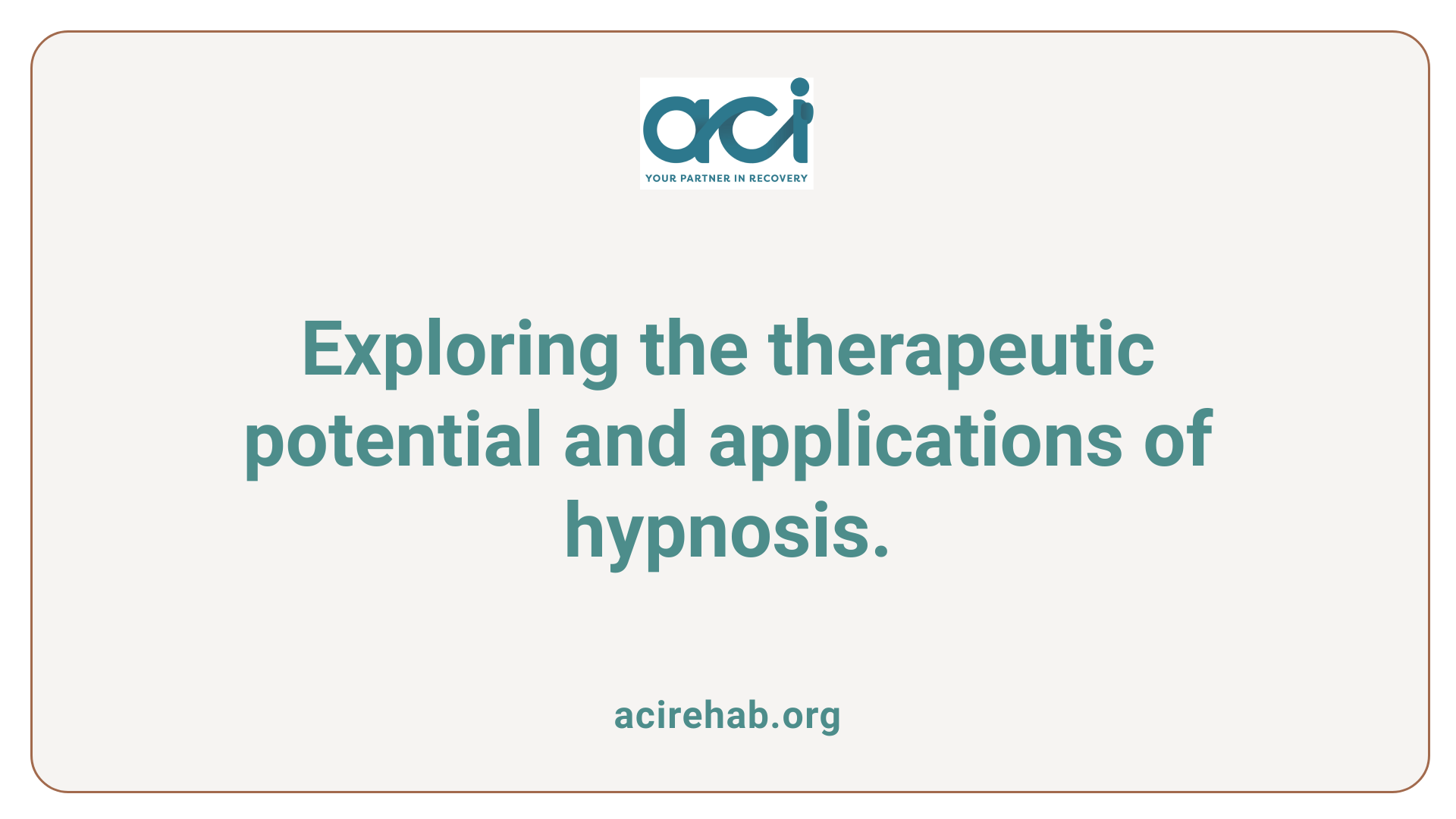
What is hypnosis and what is it typically used for?
Hypnosis is a trance-like mental state characterized by heightened concentration, increased suggestibility, and focused attention. This state is often facilitated by a trained hypnotist and is primarily used in hypnotherapy to help individuals make positive changes related to their mental and emotional health.
The application of hypnosis extends to various therapeutic areas, including:
- Stress Reduction: Helping individuals manage anxiety and promote relaxation.
- Behavioral Change: Assisting in smoking cessation and weight loss by addressing the psychological aspects of these habits.
- Pain Management: Alleviating chronic pain where psychological factors may play a role.
- Sleep Disorders: Addressing insomnia and improving sleep quality.
- Emotional Issues: Tackling phobias, stress, or trauma-related symptoms that affect mental health.
Importantly, the hypnotic process typically unfolds in stages, including induction, relaxation, suggestion, and emergence. Though scientific research on its effectiveness is ongoing, hypnosis is recognized as a safe practice when conducted by trained professionals. It is crucial to distinguish between therapeutic hypnosis and entertainment hypnosis, the latter often focusing on performance and spectacle rather than therapeutic outcomes.
How Hypnosis Can Support Drug Addiction Treatment
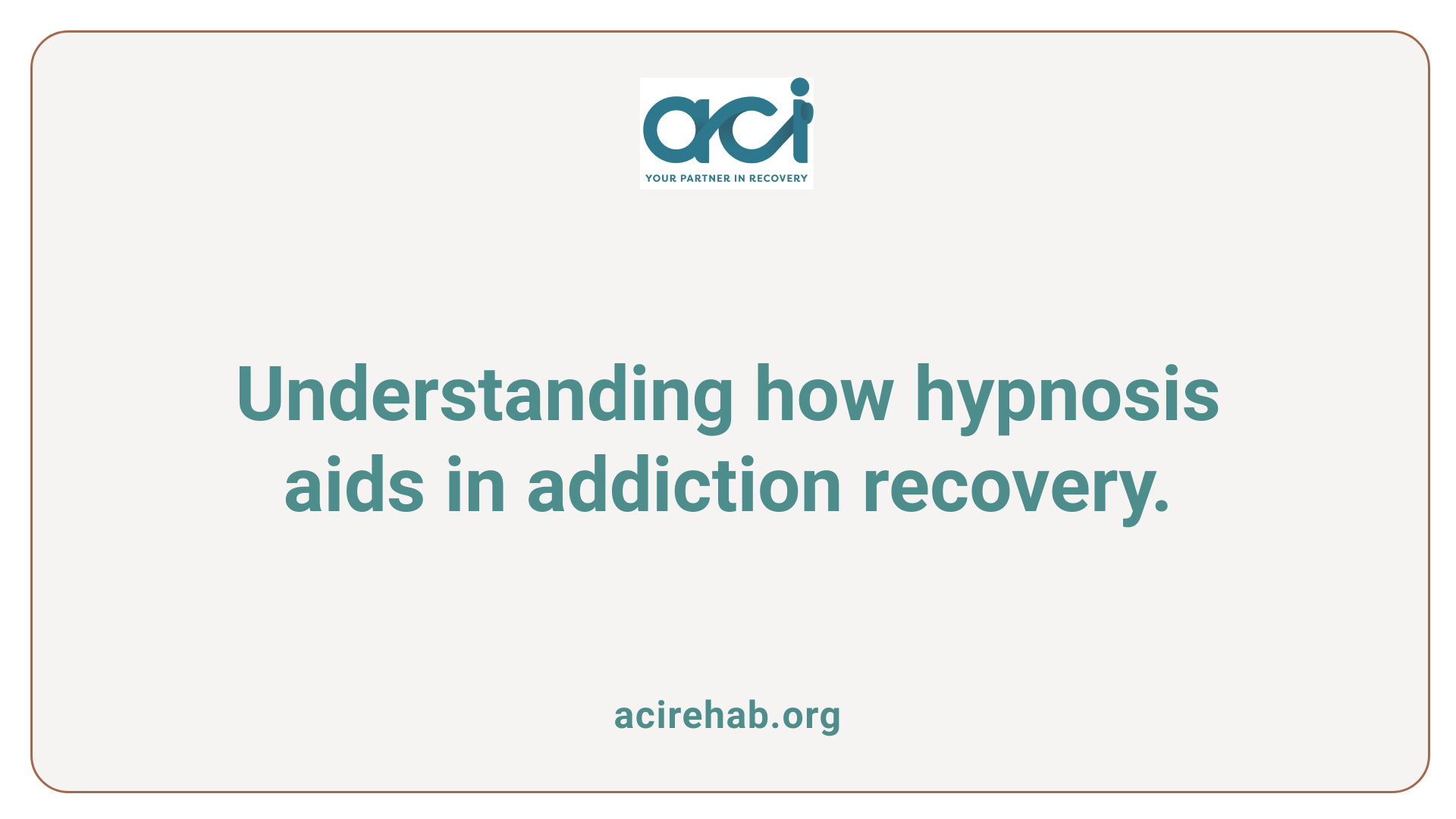
Mechanisms of hypnosis in addiction therapy
Hypnosis operates by engaging the subconscious mind, which helps individuals to recognize and modify the negative thought patterns and behaviors associated with addiction. By reaching a state of deep relaxation and heightened focus, individuals are more open to therapeutic suggestions, allowing them to reframe their reactions to triggers and cravings. This technique can uncover traumas or stress that may contribute to substance use, facilitating emotional healing and fostering healthier coping strategies.
Benefits of hypnotherapy
The benefits of hypnotherapy in addiction treatment are substantial. Research shows improvements in managing cravings, reducing withdrawal symptoms, and enhancing motivation for sobriety. It addresses psychological factors linked to addiction, leading to better emotional regulation and self-efficacy. Notably, studies reveal high success rates, such as a 77% abstinence rate after treatment involving consistent hypnosis sessions. Patients often report improved coping mechanisms and increased resilience against relapse.
Integration with other treatments
While effective, hypnosis is not a standalone cure for addiction. It is most beneficial when integrated with other evidence-based treatments like cognitive-behavioral therapy (CBT). This combination reinforces progress by helping individuals access their subconscious to confront root issues while also employing structured therapeutic frameworks to support their recovery journey.
The Efficacy of Hypnosis in Substance Abuse Treatment
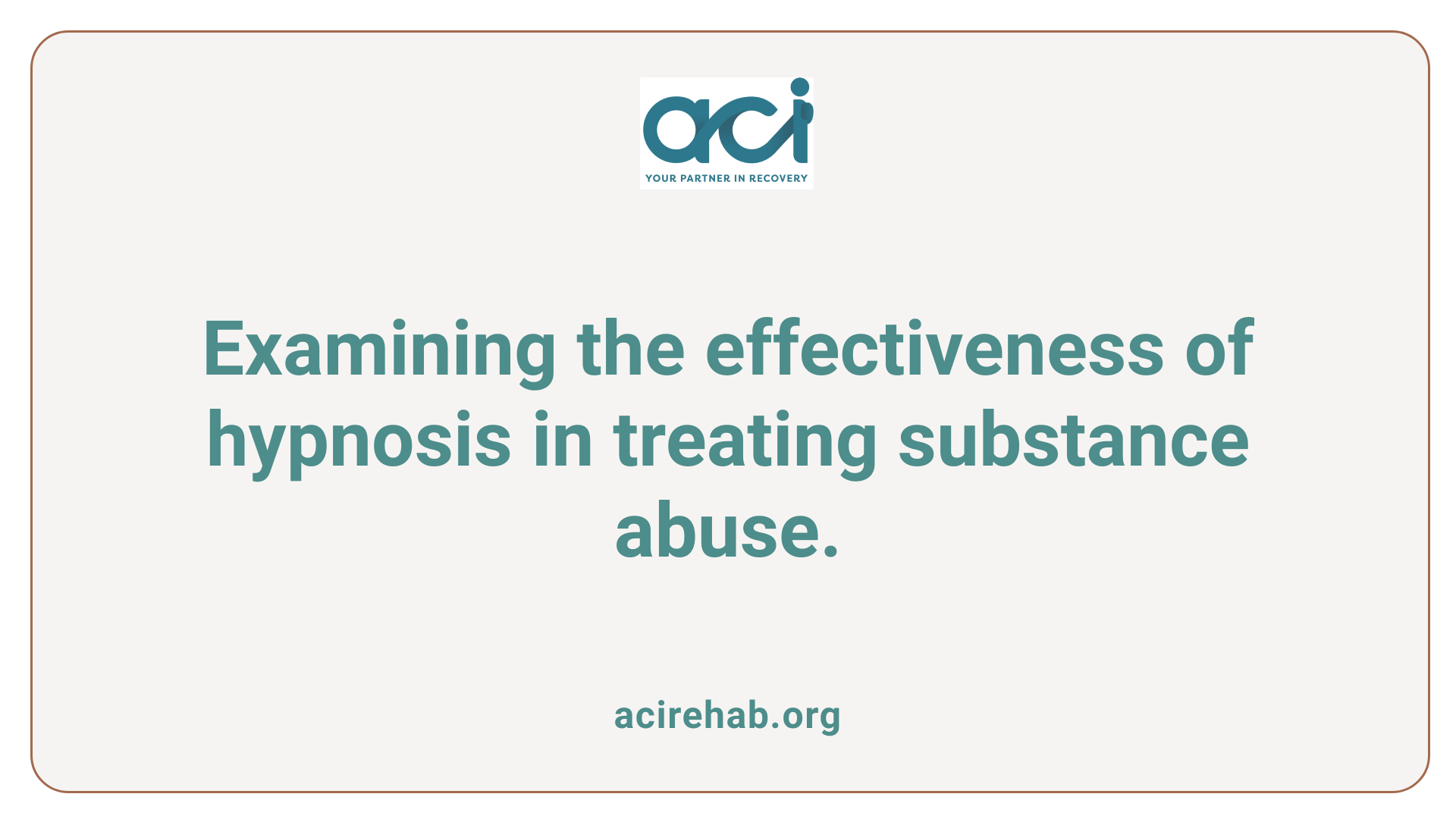
How effective is hypnosis as a therapeutic approach for substance abuse?
Hypnosis is increasingly recognized as an effective complementary therapy for substance abuse treatment, particularly when integrated with other therapeutic modalities. Recent studies provide compelling evidence of its benefits. For instance, a structured protocol involving 20 daily hypnosis sessions yielded a remarkable 77% success rate in maintaining sobriety over a one-year follow-up period. These findings are further supported by reports indicating that hypnotherapy participants experienced significant reductions in cravings and withdrawal symptoms, helping them navigate the challenging phases of recovery.
Clinical studies and findings
Numerous clinical trials have shed light on the effectiveness of hypnosis. A notable study found that 90% of drug addicts who underwent hypnotherapy completed their treatment, with 100% remaining drug-free after six months. Moreover, during two-year follow-ups, 78% continued to abstain from drugs, underscoring the potential of hypnosis in achieving long-term recovery. Additionally, research indicates that coupling hypnosis with conventional treatments like Cognitive Behavioral Therapy (CBT) further enhances treatment outcomes, facilitating a more comprehensive approach to addiction recovery.
Comparisons with other treatments
When compared to traditional methods, hypnotherapy shows elevated success rates. For instance, hypnosis has been demonstrated to be more effective for smoking cessation than conventional treatments alone. The innovative incorporation of hypnotherapy into existing treatment frameworks not only aids in coping strategies but also fosters emotional healing, making it a crucial adjunct in addiction recovery. Given the complexity of addiction, hypnosis stands out as a promising approach to support individuals in visualizing and achieving a drug-free future.
Self-hypnosis as a Tool in Addiction Recovery
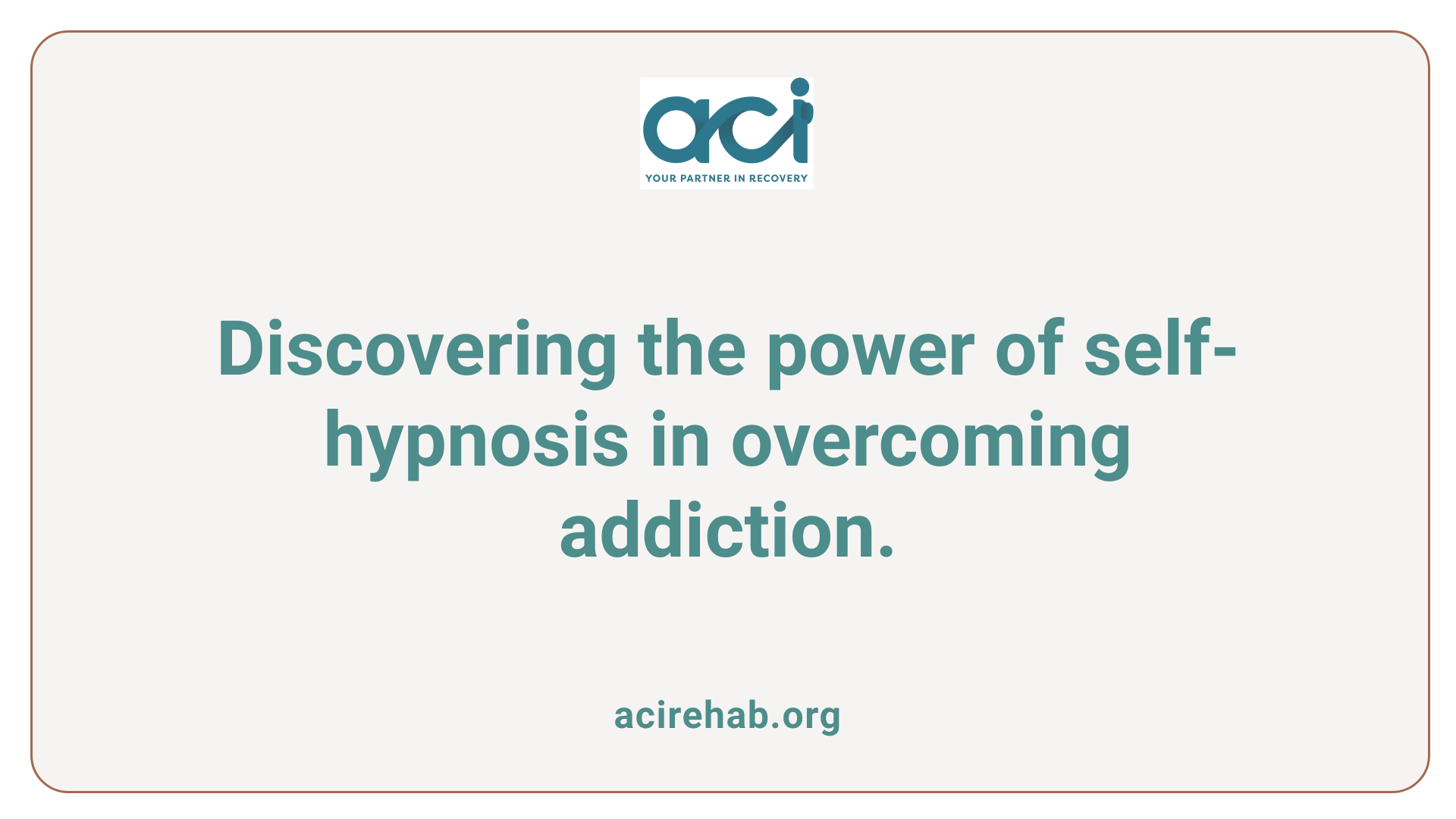
Can self-hypnosis be used for addiction recovery?
Self-hypnosis serves as an effective tool in addiction recovery, facilitating individuals to access their subconscious mind. This method helps to address emotional and psychological factors related to substance use, reducing stress and cravings—common triggers for relapse. Techniques utilized in self-hypnosis include:
- Post-hypnotic suggestions: These are affirmations or directives introduced during hypnosis that continue to influence behavior after the session.
- Visualization: Individuals are encouraged to create mental images that reinforce sobriety and coping strategies.
Benefits and limitations
Self-hypnosis can empower individuals, enabling them to transform negative thought patterns into positive behaviors. This practice can lead to:
- Reduced cravings: By modifying behaviors associated with substance use.
- Improved emotional regulation: Helping manage stress and anxiety linked to withdrawal.
However, self-hypnosis is not without limitations. While it can enhance recovery, it is often most beneficial when integrated into a comprehensive treatment plan that includes professional therapies like cognitive-behavioral therapy (CBT) or medication-assisted treatment (MAT).
Integration with professional therapy
Integrating self-hypnosis with professional therapies significantly enhances its effectiveness. Research supports its use in therapeutic settings, indicating that individuals combining self-hypnosis with evidence-based techniques report higher success rates in their recovery. The collaborative approach allows for addressing both the conscious and subconscious factors affecting addiction, promoting long-term success.
Addressing Addiction with Hypnosis: Psychological Mechanisms
How does hypnosis help address the psychological aspects of addiction?
Hypnosis provides a unique approach to confronting the psychological dimensions of addiction by engaging directly with an individual’s subconscious mind. Through this method, people can explore deeply embedded beliefs and emotions that fuel their addictive behaviors.
The process begins with guided relaxation, helping individuals enter a state of focused attention. Here, they can reframe negative thought patterns that maintain their compulsive drug-seeking behaviors. This reframing is vital, as it allows individuals to visualize healthier responses to their triggers, ultimately leading to improved coping strategies.
In addition, hypnosis plays a crucial role in emotional healing. By addressing underlying trauma and stressors, it allows individuals to process pain linked to their addiction. This not only enhances self-esteem but also strengthens motivation for recovery.
Key Benefits of Hypnotherapy in Addiction Treatment
| Benefit | Description | Impact on Recovery |
|---|---|---|
| Addressing root causes | Targets trauma and stress contributing to substance abuse. | Facilitates emotional healing and behavioral change. |
| Reframing beliefs | Modifies harmful beliefs and thought patterns. | Encourages healthier responses to triggers. |
| Enhancing self-control | Increases motivation and commitment to sobriety. | Reduces cravings and withdrawal symptoms. |
Through these mechanisms, hypnosis supports individuals on their journey to recovery, enhancing overall treatment effectiveness.
Is Hypnosis Addictive or Harmful?
Psychological Effects of Hypnosis
Hypnosis is not addictive in the conventional sense associated with substance use disorders. It serves as a therapeutic tool designed to facilitate behavioral changes rather than inducing dependency. Nonetheless, there are instances where individuals may develop a reliance on hypnosis, particularly if they have pre-existing psychological issues. This underscores the necessity for professional oversight during treatment.
Misconceptions About Hypnotic Dependency
Although hypnosis can lead to positive outcomes, such as reduced anxiety and enhanced emotional health, it does carry risks when not properly managed. Potential side effects can include feelings of anxiety, dizziness, or false memories generated from sessions. Furthermore, frequent hypnotherapy can heighten suggestibility and may undermine a person’s volition. Therefore, it is crucial for individuals engaged in hypnotherapy to retain agency and control throughout the process. While hypnosis offers therapeutic benefits, careful management is essential to mitigate possible psychological repercussions.
Dispelling Myths About Hypnosis in Addiction Treatment
What are the myths and misconceptions about using hypnosis for treating drug addiction?
Hypnosis in the context of addiction treatment is often shrouded in common myths and misconceptions that can hinder its acceptance and understanding. One prevalent myth is that hypnosis can provide an immediate ‘cure’ for addiction. However, it’s essential to understand that hypnotherapy is a gradual process, requiring multiple sessions to achieve lasting changes.
Another misconception is that individuals lose consciousness and control over their actions during hypnosis. In reality, those under hypnosis maintain awareness and the ability to reject suggestions; they do not fall asleep or become zombies.
The belief that only ‘weak-minded’ individuals can be hypnotized is also misleading. Hypnosis can benefit anyone, particularly those with strong concentration skills, as it involves focused attention.
Importantly, hypnosis should not be viewed as a standalone treatment. It works best when integrated into a comprehensive treatment plan alongside other evidence-based therapies such as cognitive-behavioral therapy. Furthermore, clients maintain free will throughout the process, being able to choose what to share and exit the hypnotic state whenever they wish.
Combining Hypnosis with Other Evidence-Based Treatments
Why should hypnotherapy be combined with other treatments?
While hypnosis offers significant benefits in addiction treatment, it achieves optimal results when integrated with other evidence-based therapies. Combining hypnotherapy with approaches like cognitive-behavioral therapy (CBT) can enhance treatment effectiveness, as these modalities complement each other by addressing different aspects of addiction.
Hypnosis accesses the subconscious to modify deep-seated beliefs, helping individuals uncover and reframe harmful thought patterns associated with substance use. On the other hand, CBT provides practical strategies to implement behavior change, equipping individuals with tools to manage cravings and triggers in real-time.
This multifaceted approach recognizes the complexity of addiction. It acknowledges that addressing both the psychological factors through hypnosis and the behavioral aspects through CBT can significantly improve recovery outcomes. Not only can individuals develop healthier coping mechanisms, but they also reinforce their commitment to sobriety, effectively reducing the risk of relapse.
Enhanced outcomes with combined approaches
Research supports the positive outcomes of integrating hypnotherapy with traditional treatment methods. Studies have indicated improved sobriety rates, with some participants achieving over 77% success in maintaining abstinence when hypnosis was part of their treatment regimen.
In practice, hypnotherapy can enhance motivation for recovery, reduce stress and cravings, and facilitate behavioral change through guided relaxation techniques. By incorporating CBT techniques, such as cognitive restructuring, individuals can learn to think differently about their addiction, reinforcing the strategies learned during hypnosis.
The integration of these approaches fosters a comprehensive treatment program that addresses both the underlying psychological factors and the day-to-day challenges of addiction recovery, contributing to a more sustainable path toward sobriety.
Recent Research and Findings on Hypnosis in Addiction Recovery
What do recent studies suggest about hypnotherapy’s role in addiction treatment?
Recent studies highlight that hypnotherapy, especially when integrated with traditional treatments, significantly enhances addiction recovery outcomes. For instance, reports indicate a high success rate with hypnosis interventions, with one study describing a 77% success rate in reducing alcoholism through a series of daily hypnosis sessions. This success was demonstrated among individuals who engaged in intensive hypnotherapy, showcasing the potential of this approach in addressing deep-rooted psychological issues.
Alongside significant recovery rates, other research, including a study titled ‘Group Hypnosis of Drug Addicts,’ reported that 90% of participants completed treatment, with 100% remaining off drugs after six months. Moreover, the long-term follow-up showed that 78% maintained abstinence after two years, underscoring the lasting impact of hypnotherapy. These findings position hypnosis as a valuable component of modern treatment frameworks, encouraging more research on its integration into comprehensive rehabilitation programs.
Implications for future treatment frameworks
The implications of these findings for future treatment frameworks are noteworthy. Hypnotherapy, when combined with evidence-based methodologies such as cognitive-behavioral therapy (CBT), can enhance therapy effectiveness by addressing psychological factors typical in addiction. Such approaches can empower individuals to unpack their trigger points, develop healthier coping strategies, and bolster motivation for maintaining recovery.
As awareness of the psychological and emotional aspects of addiction grows, so does the potential for hypnosis to play a significant role in rehabilitation efforts. Integrating hypnotherapy into treatment regimens could facilitate individualized care, ultimately benefitting the recovery journeys of many struggling with substance use disorders. This renewed focus brings hope for innovative treatment developments in addiction recovery.
The Future of Hypnosis in Drug Addiction Treatment
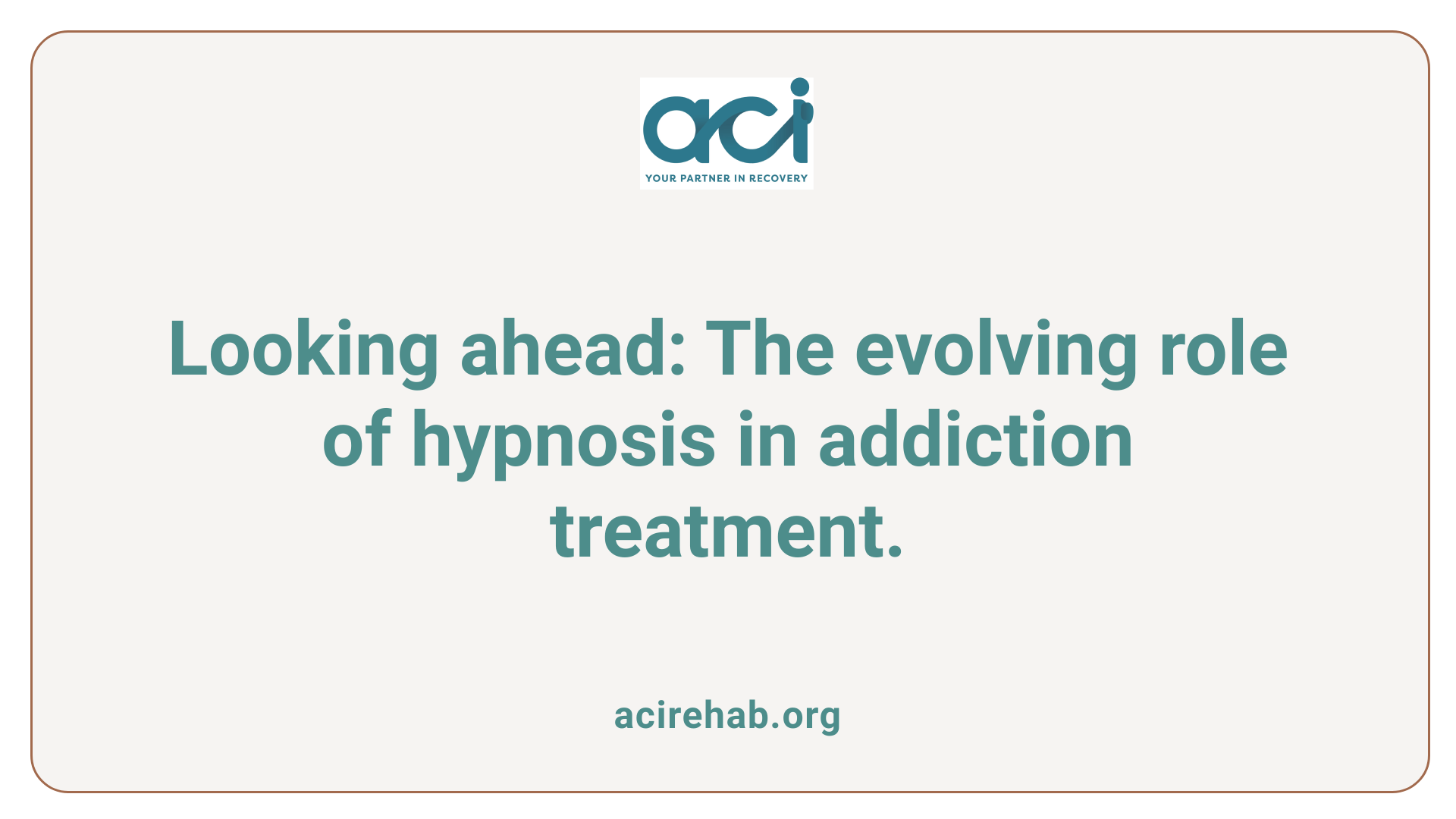
What future developments could enhance the use of hypnosis in addiction recovery?
The future of hypnotherapy in addiction recovery looks promising, especially with the potential for integrating advancements in technology. By incorporating cutting-edge tools such as neuroimaging techniques, addiction specialists can gain deeper insights into how hypnosis impacts brain activity during therapy sessions. This could lead to more precise and effective treatment interventions tailored to individual needs.
In addition, embracing digital platforms can significantly enhance the accessibility of hypnotherapy. The development of virtual hypnotherapy sessions and self-guided hypnosis applications may allow individuals to engage with their recovery more flexibly and supportively. This digital approach can bring hypnotherapy directly to those who may not have access to traditional in-person treatments.
Despite these exciting prospects, some challenges persist. There remains skepticism within the medical community regarding hypnosis’s efficacy and integration into standard treatment protocols. Thus, ongoing education emphasizing the benefits of hypnotherapy is crucial. Furthermore, rigorous research is needed to build a solid evidence base that underscores hypnosis as an integral component of addiction recovery. With increased acceptance and valid research backing, hypnotherapy can solidify its position as a vital tool in the fight against drug addiction.
Conclusion
In conclusion, hypnosis represents a vital adjunctive therapy in the realm of addiction recovery. While it cannot stand alone as a cure, its ability to access and reshape the subconscious mind offers profound benefits when part of a comprehensive treatment plan that addresses the multi-faceted nature of addiction. As research continues to affirm hypnosis’ effectiveness, its integration into mainstream recovery programs is expected to advance, providing new pathways for healing and rehabilitation. Through this exploration, we can appreciate the transformative potential of hypnosis in navigating the complex journey to sustained sobriety.
References
- What Is the Connection Between Hypnosis and Drug Addiction?
- utilizing hypnosis in the treatment of substance abuse disorders
- Hypnotherapy for Drug and Alcohol Addiction Treatment
- Link Between Hypnosis And Drug Addiction
- Drug addiction – Hypnotherapy Directory
- Hypnosis For Addiction: How It Works, Examples, & Effectiveness
- What Is the Connection Between Hypnosis and Drug Addiction?
- Does Hypnosis Work in Addiction Treatment? – Harris House
- Hypnosis and Drug Addiction Connection | Steps to Recovery

